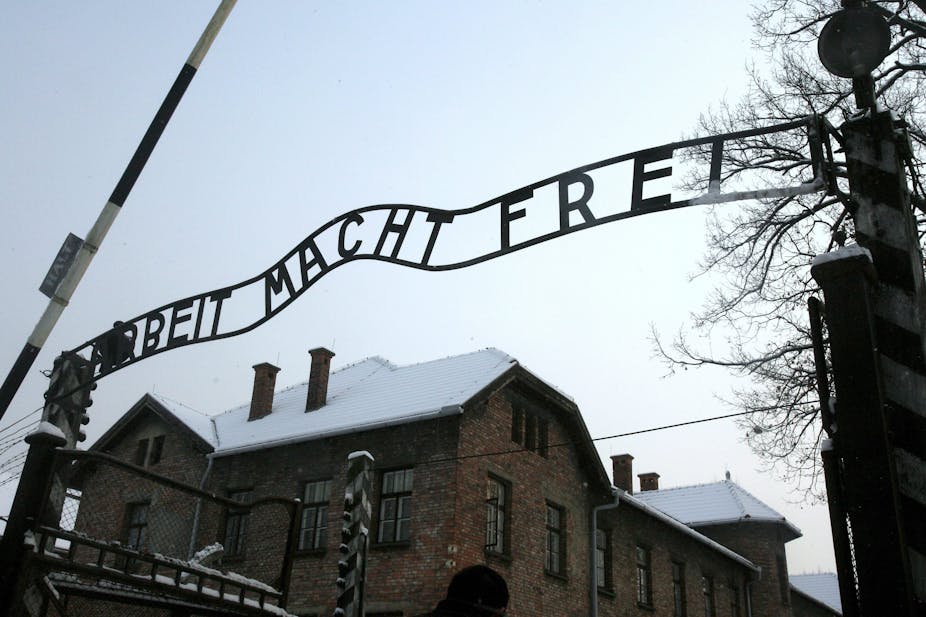“Too soon” is a phrase that gets bandied about in response to jokes about tragedy or misfortune. The implication is that a certain amount of time needs to pass before we can poke fun at loss or grief.
But when is it “soon enough”? Are some events so traumatic that we should never joke about them at all? Is a tragedy like the Holocaust off-limits when it comes to humour?
The controversy that erupted over a “Holocaust joke” segment on the radio station Triple J was telling.
To me, the sketch doesn’t sound funny (the podcast has not been posted, so I have not heard it directly). Dvir Abramovich may well be right that the sketch was senseless and offensive. I was pleased to read that the radio hosts in question - Tom and Alex - had issued an apology.
Where I disagree with Dr. Abramovich in this instance, and in his previous writing on the subject, is that Holocaust humour constitutes a major transgression, or that it trivialises or cheapens the memory of the Holocaust.
Holocaust humour is part of the landscape of Holocaust remembrance. It has a role to play. Not all examples of Holocaust humour are funny. Not all are in good taste. But to dismiss humour altogether as part of how we remember the Holocaust is to throw out the baby with the bathwater. The question is not if the Holocaust can be funny, but how, and within what ethical parameters.
Broadly speaking, there are three main sub-genres broadly encompassing “Holocaust humour”. They do not all engage directly with the Holocaust. Some of these representations may be concerned only with Nazism; some may be centred on remembrance practices. All of these genres continue to generate controversy as we move further away from the events of the Holocaust themselves.
Humour as a weapon
The oldest of these genres are those that use humour in order to delegitimise Nazism. Films such as Charlie Chaplin’s The Great Dictator or Mel Brooks’ The Producers set out to lampoon Nazis as comical and ridiculous.
Dr. Abramovich has claimed “there is nothing funny, amusing or musical about Auschwitz or Hitler”. But for seven decades, we have been reminded by Chaplin and Brooks, as well as Dr. Seuss and Monty Python, among others, that laughing at Hitler and Nazism is an effective tool in delegitimizing fascist ideologies. (Though Chaplin did later state that had he known the extent of Nazi brutality, he would never have made The Great Dictator).
What these comedians have shown us is that humour acts as a weapon against Nazism and its contemporary manifestations. Take John Safran’s interview with Holocaust denier David Irving from his recent series, John Safran’s Race Relations. That interview does as much to discredit Irving and his bizarre ideology as any exposé from a journalist or academic.
Humour inside the Holocaust
A second genre attempts to enter the interior spaces of the Holocaust, the most famous example being Roberto Benigni’s Academy Award-winning Life is Beautiful and the East German Jakob der Lügner (Jakob the Liar). Tadeusz Borowski’s This Way to the Gas, Ladies and Gentlemen, is a literary example, a memoir of a Polish prisoner in Auschwitz that shows how a certain kind of sardonic humour was one element of surviving.
Such films seek to show different aspects of life under Nazism and broaden audiences understanding of the historical events.
They emphasise the tragedy through the use of humour, and demonstrate that humour was one survival mechanism in the ghettoes and concentration camps. These also help the audience better understand the Holocaust, highlighting contradictions and ironies, nuances and complexities. They help to show the range of experiences, but also challenge audiences to think about why they might laugh, and to encourage them to remember.
Challenging memorial culture
Finally, and most ubiquitous now, are television comedy series in which it seems almost mandatory to make Holocaust jokes. Most effective are those in which the humour acts as a mirror to society. Seinfeld, Curb Your Enthusiasm, The Sarah Silverman Program and John Safran’s Race Relations all shine a light on the different ways in which Holocaust memorial culture has become ubiquitous and problematic in the 21st century.
These programs target commonly accepted symbols of Holocaust memory: Anne Frank, Auschwitz, Schindler’s List, and survivors. The critique inherent is that the prevalence of Holocaust memorialisation has led what the late historian Peter Novick described as a “culture of victimhood”.
The best example is the famous Survivor episode of Curb Your Enthusiasm, in which a Holocaust survivor picks a fight with a cast member from the television program Survivor over who has experienced the worst suffering.
Who decides?
Of course, there is a line, but who determines where it is? Should academics and Holocaust scholars decide what is “appropriate”? Should it be Holocaust survivors and descendants of victims?
Inevitably there will be those that go beyond the bounds of good taste. This is not only true when talking about humour, but any representations of atrocities. Schindler’s List was widely criticised by historians and film scholars for its hyper-realism and its simplistic, linear narrative, while the 1978 miniseries Holocaust was derided by prominent survivor Elie Wiesel as a trivialisation.
But the charge of trivialisation and cheapening the memory of six million Jews who perished does not do anything to advance the discussion about how to represent and how to remember the Holocaust. What are the implications more broadly when thinking about representing other atrocities, such as the genocides in Rwanda or Cambodia?
The best way to represent the Holocaust is not always to show it in its most brutal, but to highlight complexity and nuance, and to encourage audiences to think. The best artists do just this.

